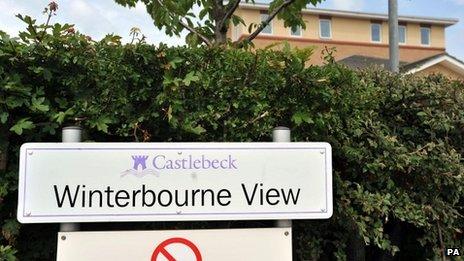Care inspector could use hidden cameras
- Published

The new inspections will determine whether services are caring and safe
Hidden cameras and mystery-shopper exercises may form part of a revamped inspection regime for care homes and domiciliary care in England next year.
New adult social care chief inspector Andrea Sutcliffe said she wanted to explore the role such techniques could play in uncovering abuse and neglect.
But she admitted their use would have to be balanced against the need for privacy and dignity in such settings.
The move will be considered ahead of the launch of a new system next year.
From next autumn, services will be given an Ofsted-style rating of outstanding, good, requires improvement or inadequate to mirror the system being rolled out for hospitals.
The new Care Quality Commission (CQC) inspections will determine whether services are:
safe
caring
effective
well led
responsive to people's needs
This replaces the current system, which relies on 16 core standards with which services are either compliant or non-compliant.
The make-up of the inspection teams are also being changed to ensure they include experts in the care sector - to date the CQC has relied on general inspectors - and members of the public with first-hand experience of the system.
The inspections will start in autumn 2014 with the aim that each of the 25,000 care homes, nursing homes and domiciliary care agencies will be inspected by March 2016.
'Fresh start'
Ms Sutcliffe - who is one of three new CQC chief inspectors following the appointments of similar posts covering GPs and hospitals - also warned she was prepared to use the powers at her disposal more than they have been to date.
The CQC can issue warning notices, fines and even close down services if they are failing.

Secret filming by Panorama in 2011 exposed abuse at Winterbourne View
She added: "This is a fresh start for how care homes, home care and other adult social care services are inspected and regulated across the country."
She said she would be discussing the option of using hidden cameras and mystery shoppers - where people posed as individuals looking for care for a loved one - in the coming months, with providers, councils and the public.
Andrea Sutcliffe says she is not encouraging relatives to install their own cameras
She acknowledged the potential of secret filming had already been demonstrated by the way the BBC's Panorama programme in 2011 exposed the abuse at Winterbourne View, a care home near Bristol for people with learning disabilities.
But she added: "We have to consider the privacy and dignity and how we can balance these."
Simon Wood, who installed his own CCTV cameras to check on the care his mother-in-law was getting, told the BBC what filming uncovered.
"Mum getting sworn act, threatened, hit, medication being poured down the sink, not being given to Mum, it was quite upsetting and quite horrendous to see what she was going through," he said.
"The final thing was when the two carers... dragged her out of a chair and threw her on the bed and threatened to smash her face in."
Care and Support Minister Norman Lamb said there were "serious flaws" in the current system that needed addressing.
"Confidence in the regulation regime has been shaken, but we have turned a corner. I welcome the chief inspector's new commitment to protecting people vulnerable to abuse and neglect," he added.
But Steve Sollars, the parent of a former resident at Winterbourne View, said he was worried the move was too little, too late.
"It's too slow to what's happening," he said.
"Winterbourne View happened two-and-a-half to three years ago. Things should be happening now."
- Published15 October 2013
- Published8 October 2013
- Published7 October 2013
- Published13 February 2013
- Published5 October 2013